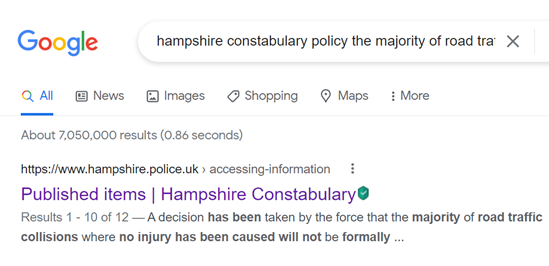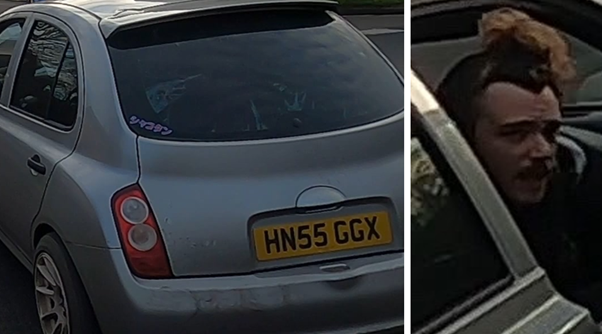5-minute read
Dermot Feenan
LLB MA LLM Barrister-at-Law FRSA
.
This publication contains troubling new information about a series of failings by Hampshire Constabulary over a report of an alleged offence and the force’s confusing public messages about (and almost-impossible-to-find, misleadingly titled, policy on) investigation of certain road traffic offences. The publication updates Complaining about the Police.
On 12 May, Professional Standards, Hampshire Constabulary, replied to my questions regarding the force’s initial response to my complaint about, principally, a failure to process my report of an alleged road traffic offence.
The police’s policy on non-investigation of certain road traffic offences has implications for any road user who expects the police to take action where the law is broken.
I now detail that latest response from Professional Standards.
First, they say that because of the failure of their system to process the report submitted on 2 February, no Notice of Intended Prosecution can be served against the alleged offender because it is a legal requirement that this be done within 14 days of the incident. While not stated by Professional Standards, the basis for this requirement is section 1, Road Traffic Offenders Act 1988. The incident I reported occurred on 28 January. My report was submitted—after I’d traced and deposed a witness—within 4 days of that incident.
Secondly, I sought an explanation from Professional Standards as to why, in the words of the police, ‘the automation was unable to run for the report […] submitted’. They say this was ‘related to the way the various systems handled [the] report and attachments.’
Thirdly, Professional Standards say that ‘a policy decision has been taken by the force that the majority of road traffic collisions where no injury has been caused will not be formally investigated.’
Professional Standards add that this policy applies to ‘allegations of poor driving where no injury or damage has been caused to a third party unless there is a significant risk to the public or evidence of repeat offending.’
This policy wasn’t stated in the online reporting system to which the public are directed to report alleged offences. It wasn’t evident, therefore, when my report of an alleged offence was considered, produced and submitted.
Confusing public messages
There is considerable coverage online of Hampshire Constabulary’s commitment to tackling careless driving, as detailed in my publication ‘Update: Complaining about the Police’.
In August 2020, it reported on the launch of the Hants SNAP scheme aimed at using submitted footage of road traffic incidents “to protect all road users”.
In October 2017, the force ran a week-long campaign ‘Give Space, Be Safe‘ aimed at raising awareness about cyclists’ safety. A total of 20 drivers were stopped by Hampshire Police after they failed to give adequate room when overtaking cyclists.
All 20 opted to receive an educational advice on site rather than face possible prosecution for careless driving. The campaign was pioneered by West Midlands Police, which reported a 20% reduction in the number of cyclists killed or seriously injured on roads in its area in the year since launch of the operation in 2016.
Hampshire Constabulary’s Summary Justice Unit manager was quoted as saying: “Those who drive carelessly or dangerously on our roads will have action taken against them. We have already dealt with a range of offences, including driving without due care and attention.”
Almost-impossible-to-find, misleadingly titled, policy
It is not possible to easily find the policy relied on by Hampshire Constabulary to not prosecute in this case. The force’s landing page doesn’t contain a link to ‘policies.’ The page has a link at the very end of the page titled ‘Advice and information’. That links to a page with 38 links to ‘police advice to keep you safe and help you understand the law’, which includes ‘Road safety’. Clicking on ‘Road safety’ links to a page with more links, including on ‘how to report incidents or collisions if they occur’. One link is titled ‘Cycling safety’. It refers to the Highway Code, adding: ‘A breach of these rules is a criminal offence’. My report alleged Code breaches. The linked page says nothing about a policy to not investigate such breaches.
Only after receiving the response from Professional Standards could I try to find the words in this policy. Searching ‘policy’ in the police search function doesn’t help. None of the 37 results it brings up are relevant.
Searching ‘road safety’ yields 54 results, but none of those bring up the policy; similarly with the search term ‘road traffic incident’, yielding 51 results. Even keying into the search function distinctive excerpts of the policy in the reply from Professional Standards drew a blank.
The only way I could find the policy was by selecting a distinctive excerpt of words from the reference to the policy by Professional Standards in its email of 12 May and by adding to this the prefix ‘Hampshire Constabulary policy’ in a Google search.

The top result showed those words against a link to a Hampshire Constabulary webpage. The words appeared on that page against a policy titled ‘1751228 Solvability Matrix 2017 – Non-injury Road Traffic Collisions’.
No road user who is not involved in collision but who wishes to report an alleged road traffic offence would know from the title of this policy that it applies to them. The title of the policy is misleading.
Given that the report was based on other published information from Hampshire Constabulary indicating they would take action, how could any member of the public know of such policy document, still less find the misplaced words about not investigating?
For the avoidance of any doubt, my concern is not that a police force may, for reasons of resource allocation, have a policy to not investigate certain alleged offences. It is that this policy is not made easily available, and published information is inconsistent and misleading.
Further failings
Professional Standards also state that upon getting through by phone to the force’s Contact Management Team on 15 March to check on the status of my report, I ‘should not have been advised to submit the details and additional information via email.’
This statement conveys what should have happened. Professional Standards have still not explained why those two emails went unanswered. However, they have apologised and stated they ‘will provide feedback to the Contact Management Team so they can learn from this.’
Professional Standards add, ‘the cause of the failed automation should have been investigated and established and the report should have been traced and manually “pushed” through the systems to create the entry on Hampshire Constabulary’s Records Management System.’
I also sought in my initial complaint an assurance from Hampshire police that ‘steps will be taken to ensure that any future alleged offence may be reported effectively to Hampshire Constabulary via its online reporting system.’
Professional Standards said that the failure with the online reporting system ‘was not a systemic issue’ and I ‘should not have similar issues in any future report.’
Police apology, further action
Professional Standards apologised for the ‘poor service’, recognised that ‘there are a number of learning points’, and said that these have been brought to the attention of the relevant team.
Professional Standards say that although no further action can be taken regarding this particular incident, details are now on file and ‘any repeat offence may now result in a formal investigation and possible prosecution.’
In the public interest, I set out here the make, model and registration of the vehicle referenced in my report: a Nissan Micra, HN55 GGX (below). I also publish below a photo of the driver. Caution should be exercised by anyone regarding any future use of these details.

This update and the original publication show that there is value in using the complaints system operated by a professional standards department within the police. The publications reveal challenges for some road users in seeking police enforcement of the law. The publications also place into the public domain information about the reporting and investigation of road traffic offences, especially affecting cyclists, which may be helpful for further education and research.
I aim to produce a future publication examining more broadly cyclists’ concerns about police failure to take action against careless and dangerous drivers, the effect of government cuts in policing, and the associated challenges posed by some political and cultural approaches to the safety of cyclists.
.
© Dermot Feenan 2022